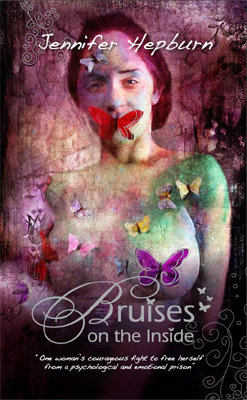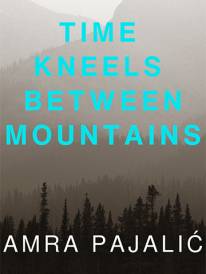Bruises on the Inside

Bruises on the Inside
Not just black eyes and broken bones
10 tell tale signs that you could be in an abusive relationship
If you were in a relationship that had the potential to turn abusive would you recognise the signs? What would you do? Who would you turn to for help?
As a brave Australian woman Jennifer Hepburn can testify, you do not necessarily have to experience black eyes and broken bones to be in an abusive relationship. As she shares in her debut book- emotional, psychological and verbal abuse can be just as damaging, and can take far longer to heal and recover from, hence the title of her book Bruises on the Inside.
After extensive research and interviews with women all over Australia, author Jennifer Hepburn not only shares her own intensely personal story of surviving and abusive relationship, but adds practical tips and advice for readers. She shares 10 signs that indicate you are in an unhealthy and abusive relationship if your partner does some or all of the following:
Threatens you, your children, family members or even pets.
Constantly checks who you are with, monitors phone calls and checks your mobile phone.
Humiliates you, embarrasses you or makes fun of you.
Makes you act a certain way to avoid his anger and blame.
Isolates you and stops you from spending time with your friends and family.
Makes you feel you have to 'walk on eggshells'.
Plays mind games and makes you feel it's all your fault.
Is jealous and possessive or accuses you of flirting.
Grabs, shoves, pushes or physically hurts you.
Threatens to harm himself or you if you leave.
Jennifer Hepburn's inspiring story will help women recognise and define an abusive relationship, why it happens, the patterns of an abuser, and how to leave safely. Jennifer proves it possible to escape from violence and go on to lead a full and happy life.
Bruises on the Inside
Self Published with assistance from The Creative Collective
Author: Jennifer Hepburn
ISBN: 9780646523781
Price: $29.95
Interview with Jennifer Hepburn
Do most women have trouble recognising the signs of domestic violence? If so, why?
Jennifer Hepburn: Most women in physically abusive relationships know that they are being abused, but many live in denial. They feel they are to blame, are ashamed or believe they have no where to go and no support. Emotional, psychological and verbal abuse is much harder to define. The abuser had control over your thoughts and feelings. They feed your low self esteem and lack of confidence, but can do so while saying they are just "helping" you. Many women do not know how abusive their relationship was until they leave, or until they are ready to share their story with others and recognize the patterns of abuse.
Why did you choose to write this book?
Jennifer Hepburn: For several reasons. Firstly because I had to repeat much of my story to legal representatives or counsellors, both for myself and my children. I also wanted a record so my children would one day know how much I love them and how hard I fought for them. Along the way I realized that I could help others, and I felt that if my story helped one women walk away from an abusive relationship, and go on and reclaim her life back - my book will have done its job. It has now become my passion to be a voice against this silent epidemic.
.Was it hard to write the book, did you feel as if you were re-living a horrible time in your life?
Jennifer Hepburn: Some parts of the book were very difficult to relive. Although I have moved on in my life, there is always a legacy that remains with me. I have tried to turn it into a positive. I found it difficult to know what to include in the book and what to leave out. I did not want the book to be vindictive in any way, but to accurately reflect my life of abuse.
Has helping others with your book helped your healing process?
Jennifer Hepburn: Definitely. After interviewing many women I recognised the same patterns of abuse that I had endured, and sharing stories and knowing you are not alone is very helpful to the healing process. I continue to meet with other women (and men) who are still going through their own emotional journey. I am happy to listen, which is sometimes all victims want - someone to hear their story
Could you share one of your practical tips for surviving an abusive relationship?
Jennifer Hepburn: Surround yourself with supportive people - family, friends, support groups etc.
In your experience who do you suggest those in abusive relationships turn to, for help?
Jennifer Hepburn: If the abuse is physical, in many areas the police have the power to remove the abuser from the home. However, this is only temporary and other plans need to be in place as well to ensure the victims safety. All victims need support to understand not only their options, but what to expect from their abuser when they take the steps to leave. The end of the relationship is when the abuser is most dangerous. Victims MUST seek help. There are many organizations specifically designed to help victims. Many have lived through their own abuse and all are understanding and helpful. These groups/organizations can be found on my website or in my book. Confiding in family and friends they trust is also advised.
How have you recovered from your experiences, and what tips do you suggest others use in their recovery process?
Jennifer Hepburn: Recovery is ongoing. I still have to deal with the legacy left by my abuser in myself and especially my children. Counselling has helped, but having my new husband's support, and that of friendships I have re-established is very helpful. Writing my book definitely helped, as the more I researched and spoke to other survivors made me realize how and why these abusers work, and that I was not to blame. I slowly reclaimed my life back, and became the person I was meant to be. I built up my self-esteem and my confidence in my own thoughts and abilities again.
What should a female do if they find that their partner does more than one of the 10 signs that indicate you are in an unhealthy and abusive relationship?
Jennifer Hepburn: It depends of the individual relationship. If she feels she can relate to the signs, she should take a long look at the relationship, and how she has changed since it began. The first step is acknowledging the abuse. If there has been no physical abuse she could begin by talking to her partner - some men simply live how they were brought up and may not realize they are being abusive. If this appears futile, or she is unsure or afraid, there are many organizations that will help and support her. She needs to seek help. This is PARAMOUNT. She should equip herself with the knowledge necessary to make the important decision to leave to escape the abuse. Confide in a close friend or family member, or if she has been isolated from family and friends, many police are familiar with Domestic Violence and have sound advice and brochures available for further information. She needs to start to separate fact from emotion. She needs to know that there IS help and support available.
MORE



